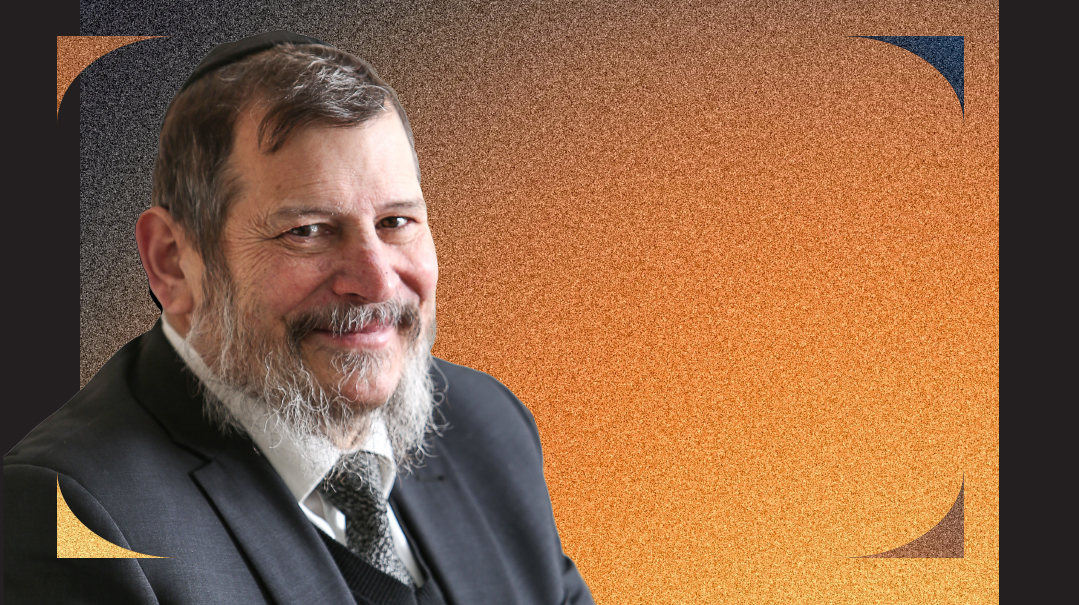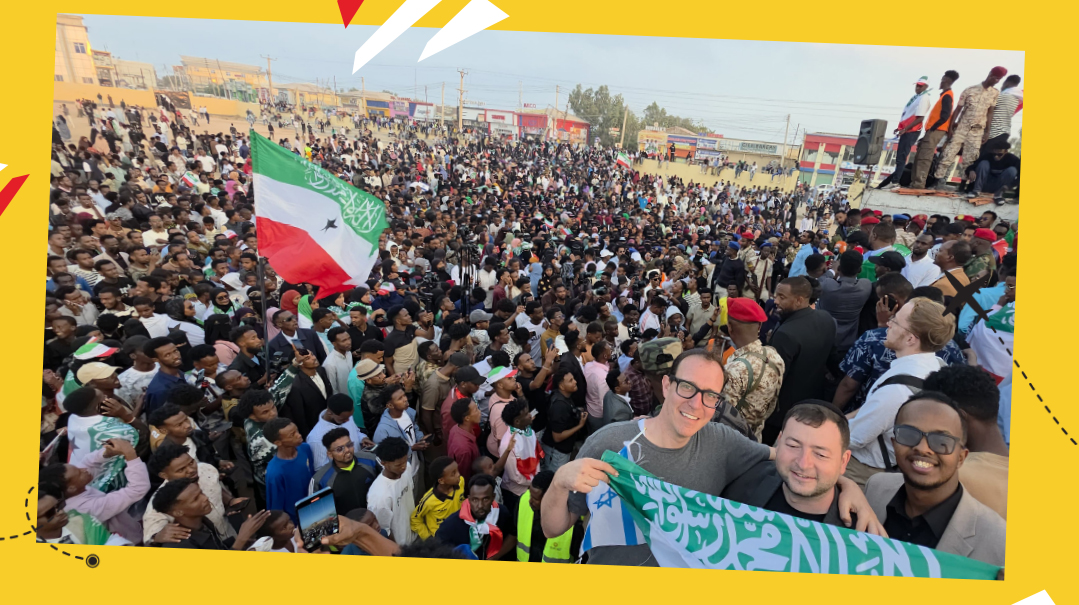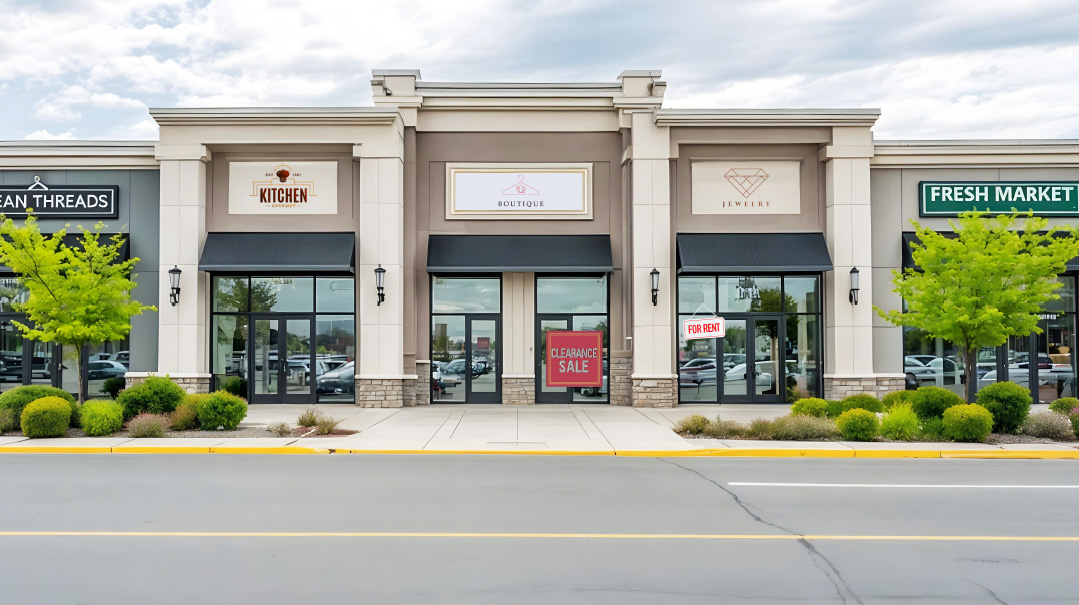On the Giving End

Meah Shearim mega-host Yanky Shisha aims to eliminate the hunger and shame of his childhood poverty
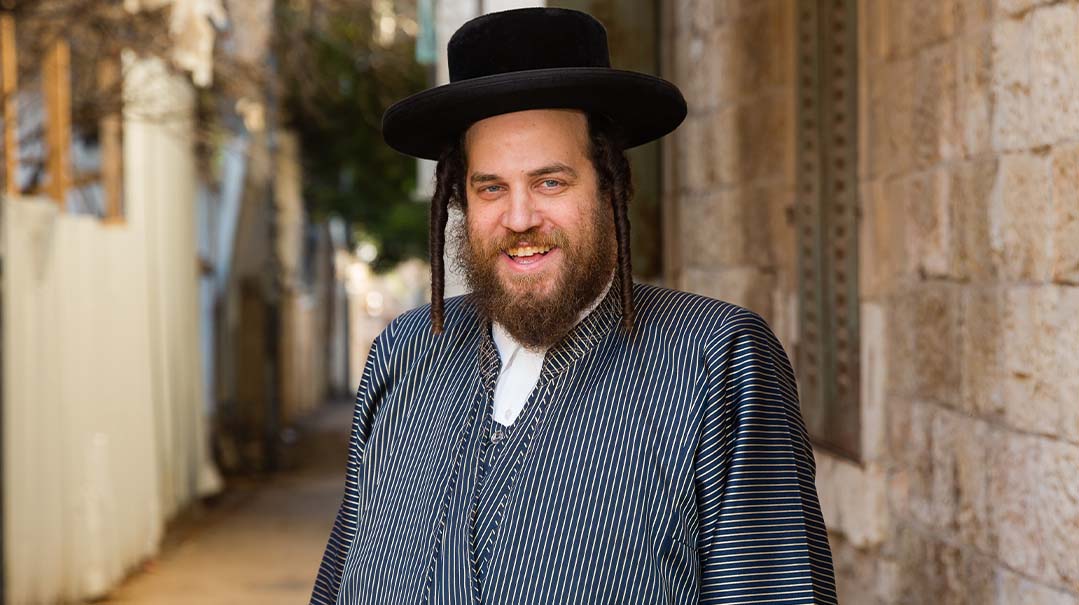
Seeing him stride purposefully through the Meah Shearim shuk, thumbs tucked inside the gartel of his “zebra” caftan, you just know that Yanky Shisha is king of the neighborhood.
It’s not only that he’s the patron and supporter of hundreds of poor families in these parts, or that he’s the backbone of widows and orphans, or that he hosts over a hundred bochurim every week at his Shabbos table, or that he pulled himself out of the poverty of these ancient, hallowed Yerushalmi alleyways to create both a national chesed empire and a formidable private real estate operation. These are the people he loves, the community he calls his own, and from the time he was a little boy, he had a dream to help them live in dignity. Today, the 38-year-old dreamer has seen his vision come true.
Like his parents and grandparents before him, Yaakov Eliezer Shisha was born in Meah Shearim to a family of Toldos Aharon chassidim. He’s the oldest of 13 children, “born,” he says, “into one of the poorest Jewish areas in the world, with very little chance for material success in life.” His father worked hard but barely made ends meet, and whatever he earned went to rent and utilities. Not much was left to feed his large family.
Maybe Yanky was overly sensitive, maybe he had a certain pride that others didn’t, even though almost all the kids in his neighborhood were in the same boat. But he still remembers the humiliation of standing in line, waiting for approval for Shabbos or Yom Tov packages or other kinds of support, and then going to a distribution point and filling up a shopping cart, often with factory seconds or packages that were bent or about to expire.
That’s not to say he didn’t grow up in a warm, loving, stable family. “My parents did everything they could for us, but they couldn’t do too much,” Shisha says, categorically dismissing the idea that today, there isn’t real poverty, and no one goes hungry anymore. “It’s not just Meah Shearim, and not just 30 years ago. It’s all over the country, until today. The salaries of many people, even those who are willing to work hard, just don’t cover the cost of living today. And I’m not even talking about widows and others who’ve lost their source of parnassah. You can’t not pay the electricity, they’ll shut you off, and you can’t not pay the rent, because they’ll throw you out. There are many families who simply have no money for food.
“So back then, we kids took the brunt of it, and as the oldest, I felt especially responsible. We’d go to the stores on Friday afternoon or after closing and take the leftovers or the discarded produce. And then there were the cheder melamdim who would bring loaves of bread for those of us who ‘forgot’ their sandwiches. I remember how my second-grade rebbi would go around to the shuls Motzaei Shabbos and gather all the challah that was left from Shaleshudis, and then he’d slice up the challah and sprinkle sugar on it. Every kid knew that if he was hungry, he could go to this rebbi. Until today I still taste the chesed of that challah and sugar.”
From the time Yanky was a kid, he had a dream: When he grew up, he would make sure his own children wouldn’t always be looking at the groceries other people were bringing home and wondering when they’d be able to buy more than one container of milk and one loaf of bread. But more than that, he would make sure that even if a family has to be on the receiving end, no child would have to stand in line and beg at the expense of his self-respect.
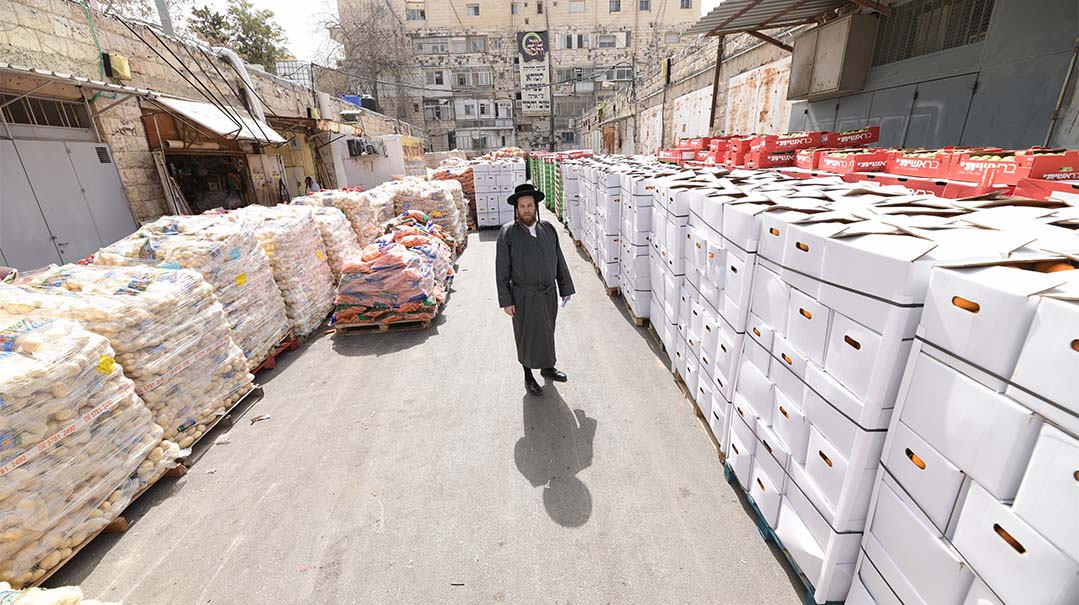
Yanky Shisha’s multimillion dollar chesed enterprises started out the day after his sheva brachos with a pushke in the beis medrash
The opportunity to realize his dream wasn’t long in coming. At 19, Yanky, a sheltered Toldos Aharon bochur without a clue to the “outside,” married Rivky, and already during sheva brachos, he was sharing his vision.
“I was telling her about the tzaros I went through as a kid and the big pie-in-the-sky plans I had to help others,” Reb Yanky remembers, “and she started to laugh. ‘Tzaros? You had it hard? What do you know about tzaros?’ And she was right. Her mother died when she was eight, leaving fourteen orphans — the oldest was three days before the wedding and the youngest was five months old. It was really horrible for them, and by age 12, as a lone girl sandwiched between 10 boys, she became the mommy to her younger brothers. After we exchanged war stories and figured out who had it harder (she won), we decided together that we were going to make things different.”
After the wedding, there they were, two young kids — albeit with loving families but with no financial support. Today Yanky Shisha is considered one of the most gifted, sincere, and reliable fundraisers around, but his multimillion dollar chesed enterprises started out the day after sheva brachos with a pushke in the beis medrash. He began raising funds and gathering food for several poor families in the neighborhood, and it wasn’t long before word got out that this young avreich, who hadn’t even turned 20, could really help.
“We got married on Rosh Chodesh Cheshvan, and right before Chanukah a fellow approached me. ‘I see you’ve been raising money,’ he said. I told him I’m trying to help a few families who are in dire straits, and then he told me that he was in desperate need of a refuah and heard about a segulah to distribute olive oil to poor families. Could I help him out, serve as a middleman to deliver oil to needy families? So he gave me $1,000, and I bought 200 bottles of oil for families approaching Chanukah with nothing. That was my first chalukah.”
A few months later, the month before Pesach, Shisha had a plan — or perhaps more like a fantasy: He was going to do a modest kimcha d‘Pischa for several hundred families in a discreet, dignified way so that the foodstuffs would come to their door like a regular grocery order.
“I was hyper-focused and made everyone around me crazy,” he admits. “I decided to do this right before Purim — very late in the game — so I went on a 24-6 campaign to raise the money. I went to shuls, got friends on board to speak to anyone they knew, and I cornered some American bochurim I knew who were going back for Pesach. I had them commit to raise money there. Then I went to distributors who gave me products for a good price or on credit until the money came through, and I’ll never forget my very first meeting — it was with Teperberg winery owner Motti Teperberg. I was a Meah Shearim kid who at the time could barely speak Hebrew, so I took my father along to translate.”
And in the end, the Meah Shearim kid did it: 500 families greeted Yom Tov with two full boxes of Pesach staples delivered to their doors. It cost him $70,000.
Today Yanky Shisha is seeing his dream come true in real time. That first kimcha d’Pischa distribution eventually morphed into Tov V’Chesed, a center of tzedakah and mitzvos that takes up a good part of Rechov HaMasger, an alley off Rechov Baharan in Meah Shearim. Today’s food distributions provide Shabbos provisions — fruits, vegetables, chicken, challah, grape juice, and baked goods — to struggling single-parent homes, a monthly supply of groceries for hundreds of impoverished households, and full Yom Tov provisions for thousands of families across Eretz Yisrael. This past Succos, the organization distributed over 10,000 complete Yom Tov packages to poor families around the country.
Reb Yanky says he’s learned on the job about tweaking the food packages for maximum benefit. Originally grocery staples were delivered once a week, until people complained, “Rabbi Shisha, you’re telling us what to eat. One week we need to eat corn, the next week couscous, the next week pasta.” So he decided instead to give the entire month’s groceries at once.
He also learned that, for the kavod of the recipients, it’s better to collect funds and purchase quality products, rather than to rely on product donations from factories and suppliers. Most factories will give seconds or products that are mildly defective or about to expire. And that, he says, is not the way he works. A visit to his distribution warehouse proves it. There are no seconds here; instead, there are platforms of grade A products such as brand-name pitted olives, pre-sifted flour, and Osem ketchup (as opposed to the cheaper knock-off).
“I never want a family, who has it hard enough, to feel like they’re getting factory leftovers or seconds,” he says. “For me, kavod means three things: that the family gets it delivered to their door, that the quality and products are first-class, and that the entire sign-up process is also done in a discreet way. Today no one had to come to an office and wait in line. That’s why Hashem made faxes and email — so that Yidden can help each other in a dignified fashion.”
The food distribution is just one part of Yanky Shisha’s chesed empire. Tov V’Chesed has also become a national headquarters for helping orphans and widows.
When widows began asking him for help in making bar mitzvahs and marrying off their children, Reb Yanky took it on himself as another personal mission. He began looking for benefactors who were making their own simchahs at the same time, presenting them an offer they couldn’t refuse: Maybe as a zechus for their new young couple, they could also marry off an orphan?
And it wasn’t just weddings. When Shisha was just 21, he went on his first fundraising trip to the US and met a new friend — Rabbi Herschel Pincus, a sofer who owns a popular Judaica store in Flatbush. Never shy and always forward-thinking, he asked his proprietor friend, “When someone comes in to buy tefillin, maybe you ask him if at the same time he’ll sponsor a yasom’s tefillin as well?”
To date, the organization has married off over 1,300 orphans, and that means it pays for the family’s entire side of the wedding — half the catering, half the hall, half the photographer, music, and other expenses for the night. (This week’s wedding schedule, for example, includes a kallah who was just a baby when her father, grandmother, and 8-month-old twin sister were murdered in a terrorist attack, and the kallah herself lost an eye.)
Up to five weddings in just one night can easily come to $45,000, and there can be several such nights a week. With such pressing multiple-digit commitments on his head, you’d think Yanky Shisha is probably some stressed-out, high-strung chain-smoker, but the hundreds of people he supports regularly, the dozens of avreichim whom he counsels informally in shul, and the masses of bochurim who pass through his dining room can all attest to the fact that he’s one of the calmest guys you’ll ever meet. And the bigger the project, the more positive energy it seems to generate.
“I know the money will come,” Reb Yanky says, “because Hashem’s supply is endless.”
That’s why he’s so excited about his latest innovation in funding weddings for the poor — he’s just built twin upscale wedding halls in Beit Shemesh, where the night’s “regular” wedding offsets the cost of an orphan’s wedding on the adjacent dance floor.
Yanky Shisha’s natural warmth and engaging personality formed a magnet for many orphaned bochurim who found their way to his distribution center, helping to pack boxes for families. Sometimes they’d hang out in his house as well. For boys who felt uncomfortable going home, it was a better option than being on the street. And that’s how he found himself caring for 1,600 orphans — both boys and girls — on a monthly basis, and why he’s already purchased five well-appointed residential apartments in Jerusalem, Beit Shemesh, Beitar, and Bnei Brak as after-school centers for children and teens who live at home, but where home can be complicated.
Sometimes these young people are struggling with the complexities of blended families. Sometimes the suffering of the surviving parent, or other family dynamics, make for an overwhelming reality. In these centers, with good food and a professional staff of therapists and educators, they’re understood and accepted and can just be themselves among others who speak their secret language.
“It’s a really warm, special atmosphere,” says 21-year-old Srulik, a chassan and talmid in a Jerusalem yeshivah, who’s been frequenting the center since he was orphaned from his father at age 10. “Even though I’m in a dorm, it’s like going home for a few hours. And the reality is that we’re unfortunately a club, not that we wish it on anyone.”

Two for the price of one. At the new Kramim hall, one wedding finances the other. Who wouldn’t want the zechus?
While he was still in shanah rishonah, Yanky Shisha was well on his way to fulfilling the first part of his dream. But there was another part — he was determined to be successful in his own right, to become financially secure, to get himself out of the poverty loop.
“When I started the chesed projects, I knew I also wanted to start some kind of business in order to bring my own parnassah,” he relates. “But I was a young avreich out of Toldos Aharon. I didn’t know a word of English and could barely speak Ivrit. I told my wife, ‘I don’t know how to do anything, maybe you know something that we can make into a business?’ She said they learned cake decorating in school, so I said, ‘sounds good.’ So we opened a business, ‘Cake Plus,’ where we sold decorated cakes and baking supplies that I bought from industrial companies and repackaged.”
The business lasted two years, but the dream parnassah wasn’t there. People in their circles didn’t have the money to splurge on fancy cakes, and Yanky himself realized early on that there wasn’t a lot of room for growth with his little home business.
“I wanted to look for something broader, I wanted to take the next step. So I started contacting people who could coach me in business,” he recalls. Beneath the pleasant veneer of his voice, there’s something sour as he says, “but I kept getting the same message: ‘Forget it, you’ll never succeed. Your background is stifled, you have no skills, your family was never in business, you were born and grew up in a kehillah that has no businessmen, it’s a whole different language and mentality, and you just don’t have it. Go work for someone, go become a first-grade rebbi and bring home a salary, but forget striking out on your own.’ ”
Reb Yanky squares his shoulders. “Still, I knew deep down that I could prove them wrong.”
Reb Yanky knew nothing about real estate, but every time he’d hear about properties, about buying and selling, something went off in his head.
“I started tagging along with other agents,” he relates, “until I finally got my own break: A friend from the US who was helping me with fundraising was planning to come to Eretz Yisrael for Lag B’omer and asked me to find him a really nice apartment. This would be my big break!
“So I found what I thought was a really nice apartment — the walls were clean, the toilets worked, to me it looked fine — what did I know? For the Meah Shearim area, it was luxurious. But when he saw it, he screamed at me. ‘This is a nice apartment? Are you making fun of me?’
“Then it dawned on me that people do want real upscale apartments, and maybe I could help find them. This fellow was a real friend and was willing to help me. He even built me a website for kosher short-term rentals in Israel, the idea being that I would find nice apartments, take pictures, put them on the site, and people would start calling.”
Today, after many years of traveling for business and fundraising, his English is nearly perfect, but back then he didn’t even know what the letters of the English alphabet looked like. And that wasn’t going to work when he needed to start sending out emails in English.
“I had a friend from cheder who taught himself a little English when we were kids,” Reb Yanky says. “So I’d call him and put him on the loudspeaker, and when my partner in the US would tell me how to spell out something, my friend on the other line would say, ‘A’ is by the ‘shin,’ so I’d press shin…”
If Reb Yanky was going to be doing business with Americans, he at least needed to speak a little English, and owes his now quite proficient vernacular to an early benefactor.
“When I first started fundraising for my distributions, someone told me about a fellow staying at the David Citadel Hotel who might help me out,” Shisha recalls. “But this guy didn’t know any Yiddish, and I told him that was all I spoke. So he said, ‘Okay, speak in Yiddish, and I’ll try to understand… So, how much is the kimcha for one family?’ I told him $260. He said, ‘I’ll give you for 100 families, but it’s the last time I’m letting you speak to me in Yiddish. Next time we meet, you’ll speak to me in English, and I’ll give you the same amount.’ That sounded amazing, but I wasn’t sure I understood him. He couldn’t have meant $26,000. I was already outside on the street, but I went back up and asked him, ‘Wait, you really mean $26,000?’
“Well, he kept his word, and each time we meet, my English gets better and better.”
Meanwhile, so did business. It was as if his chesed projects had a direct correlation to his financial success. Fast-forward 15 years, and today, Shisha Realty is one of the biggest agencies in Jerusalem that deals with upscale Israeli rentals, sales, property management, and vacation rental packages for residents from abroad. Even Covid turned out to be a blessing for the company, for while short-term vacation rentals over the last two years tanked, people have begun to feel less safe in their cities in chutz l’Aretz, and the buying market has soared.
Does it bother these more “modern” clients that that their agent is an authentic Toldos Aharon “zebra”?
“When I started out,” Reb Yanky admits, “some people told me it would be a real turn-off. ‘You look like those guys who make anti-Zionist demonstrations, no one will want to do business with you,’ they said. But I’ve learned that I have my derech, this is how my father dressed, and this is how I dress, and we don’t change. It hasn’t hurt business at all — in fact, I think people even appreciate it. They see a certain stability, a person who stands up for his principles and his mesorah.”
Maybe that’s one reason bochurim flock to his Shabbos seudah.
These days, he has about 100 bochurim around his Shabbos table (conversing comfortably with him in English). Ask any Anglo bochur in Jerusalem for the happening place on Shabbos, and he’ll tell you “Shisha — Rechov Salant 18.” (Better to call first. Although no one is turned away even if the room is crowded, Reb Yanky is sometimes abroad.)
Today the Shishas live in a huge home with an opulent dining room to comfortably contain their ever-growing guest list. Reb Yanky bought an old churvah and made it into a palace. Still, he says it’s not about how much room you have. “When we lived in a tiny apartment in Batei Ungarin, we also packed in the guests. It’s about how much room you have in your heart.”
Reb Yanky says that from the day they were married 19 years ago, as long as they’re home for Shabbos, he and his wife have never had a seudah without guests.
“Right from the beginning, my wife and I spoke about it,” Reb Yanky says. “We agreed that if Hashem blessed us with food for Shabbos, we’d share it with guests. The very first Shabbos we ate at home, we decided we’d look for some guests, and after davening on Friday night, I saw two American bochurim who needed a place to eat. So I brought them home — my very first guests.
“The next time we were home for Shabbos, they also came, and this time they brought another friend. Now, we got a nice set of dishes for our wedding, a service for six, so we had more than enough for us plus three guests. But the time after that, a couple also came along, and we were missing a plate. I told my wife, let’s just use disposables, but she adamantly refused. ‘If we’re having guests, we’re going to serve them the right way, in honor of Shabbos. Let’s buy another set.’ And until today, with over a hundred people in our dining room, we only use real dishes.”
In the early years, Yanky and Rivky Shisha would stand together at the kitchen sink after their Shabbos seudah washing and drying dishes, but times have changed. They still use elegant porcelain, but these days two workers come after every seudah to clean up. And of course, there’s always a cadre of bochurim eager to help.
Rivky Shisha is the real heroine of the weekly Shabbos project. She — with the help of her now teenage daughters — prepares everything herself, starting on Tuesday night when both large ovens are fired up. (When I called her last Thursday to ask where she was up to, she said she was making challah, one daughter was preparing cucumber salad, another was making matboucha, and a third was cleaning up the counters so she could start on kugel.)
Rivky admits it’s a project, but she says she looks at it like any job you do all week. And, she notes, they started out with two bochurim and gradually grew to a hundred, so it never really felt too overwhelming — “although,” she says, “I never dreamed we’d get to such numbers. But we take each Shabbos as its own separate project.”
True, the Shishas decided early on to build their bayis through chesed, but she believes any woman can have guests, with an attitude adjustment.
“Many women get nervous, because they haven’t figured out why they’re doing it. Is it for their kavod, in which case everything has to be perfect, or for the guests, who are really happy with anything? If you’re doing it so the bochurim can be happy, then of course you make it nice, but it’s not about you. They want good, simple food, a place where they can sing and farbreng. I make the exact same food every week. People who were here ten years ago see it’s exactly the same menu – a good, filling meal with lots of shefa. No one cares if I kill myself over a fancy dessert.”
While the Shishas prepare about 200 generous portions of fish and meat every week, Reb Yanky says he doesn’t let any of his guests — or their fathers — sponsor his seudos. “I believe that a good part of my hatzlachah is that we honor the Shabbos,” he says.
He also never asks a bochur who comes in what his name is and never plays Jewish geography. “After the seudah, bochurim will come up to me and tell me, ‘My dad’s your best friend,’ or ‘I used to collect money for you before Purim,’ but I don’t want any bochur to feel left out or second class if he’s not the son of a VIP.”
Sometimes people ask the Shisha kids if they mind never having private time with their Tatty at the Shabbos table.
“They were born into it, this is what they know,” says Reb Yanky. “Someone once asked my son if he ever gave up his bed for someone else. My son didn’t even understand the question. Every week they sleep in a different bed. He answered, ‘Why, is it a problem that I don’t have a kavua bed?’
“I once learned an important lesson I’ll never forget, about what, if anything, is really ours,” he continues. “In our old apartment in Batei Ungarin, our neighbors were an elderly couple who cooked exactly what they needed for their meal. One Shabbos two fellows knocked on our door, but we weren’t home that week, so they knocked on the neighbor’s door. ‘We’re really sorry to bother you,’ one bochur said. ‘We thought we’d eat at Shisha, but they’re not home, maybe you know where we can eat?’ So the old man said, ‘Don’t worry, you can eat by me. Come in.’ So they sat down and started eating, and somewhere in the middle of the seudah, they realized that the fish they’d been served was meant to be this couple’s fish for tomorrow, and when the soup came out, it was tomorrow’s cholent. They felt so bad they ate all the food, that the next day they went to someone they knew, asked for some extra fish and cholent, and brought it to the elderly couple.”
People have taavos for all sorts of things, but those who know Yanky Shisha say his biggest taavah is to give — it’s almost like an addiction. “I once saw how before Yom Tov, he was sitting in the Toldos Aharon shul signing up all the avreichim for assistance,” says a bochur who’s one of the Shisha regulars. “There was nothing technical about it — it just flowed from this warm personal relationship with each one. His heart is wide open.”
Yet as much as he loves to feed the needy and help the broken souls of his community and beyond, he also has a taavah to see others succeed, to see those who think they’re trapped and have no options move forward. He takes his own siblings as an example. Today one brother is an askan with high-level connections in the IDF and government who helps yeshivah bochurim obtain deferments, another is a Hatzolah captain, and another is manager of the realty offices.
“Back when I started out with the distributions, all my brothers and sisters helped, and they saw how you can really move above yourself when you help others. I was the oldest, and they saw me, with no background, just going forward and making a difference. They realized they could too. I tell it to everyone — you can start even if you think you have nothing, just like I did.”
He mentions his personal travel agent as a case in point. “Early on, I needed a ticket to chutz l’Aretz, and just then a young avreich comes to me and asks me to help him out. I tell him, look, I have to fly to the US next week, maybe you get me a ticket, and I’ll give you the commission? He says to me, ‘You think I can do it?’ I told him, ‘You know, we’re in a kehillah of a thousand families, and there’s not one travel agent. Just figure it out and get me a ticket.’
“End of story: He opened up an agency, took some courses, and became one of the big names. Today he’s still my agent.”
Today Reb Yanky gives motivational workshops and lectures to avreichim who have come from the same place — the place of hopelessness, of thinking the only way to survive is to go into debt, juggle loans, and wind up with a heart attack — and shows them that it doesn’t have to be that way.
“I was recently invited to speak to a group of 200 kollel avreichim about getting out of their financial quagmire, and how to be creative for some added parnassah. So I told them, an avreich gets to kollel at 9:00 or 9:30, learns until 1:00, goes back from 4:00 to 7:00. That’s seven hours. Even a working man can squeeze in seven hours of learning if he’s very disciplined. And even if you want to stay in learning — and you should if you can — there are enough hours to find a way to make extra money and utilize the time. Of course, whoever has the capacity to learn during those hours, that’s the first priority, but to tell yourself that because you learn in kollel you can’t do anything else is just not true and will keep you stuck. It’s all about perception.”
But Reb Yanky is also quick to qualify that he’s the last one to give pat answers about family economics. He’s in the real estate business and knows firsthand how families can barely afford rent, how living in Jerusalem today is beyond the means of most Israelis, unless they choose to live in an airless underground storage room that’s been converted to living quarters, or what he calls “dirot slach-li,” apartments that are so small the couple is always bumping into each other saying “slach li” (“excuse me”). He knows that the cost of living in Israel is the second-highest in the world after Switzerland, and that between his business and the organizations he runs, he gives out about 200 standard market-based salaries every month, knowing that most people can’t make it through the month on those salaries.
So meanwhile, he’s doing what he does best. Helping families survive as everyone weathers the predicted economic storms of pre-Messianic times. “I’m just one person,” he says. “But as long as Hashem gives me koach, for me it’s about everyone else.”
(Originally featured in Mishpacha, Issue 899)
Oops! We could not locate your form.

